► The best places to charge your EV in 2024
► Charging infrastructure slow to expand
► Who provides the best EV charging network?
Picking an EV or one of the best hybrid cars is one of the most significant thing you can do to save the planet these days. But all is not rosy in the electric car charging market. For householders with a private driveway, there’s a need to pony up around £1000 (possibly more) for home charging – and there are few grants available nowadays. For the rest of us, we’re expected to rely on the public charging network.
Despite government pledges – in the form of bucket loads of cash – essential public electric vehicle (EV) charging stations are not being installed quickly enough. What’s more, recent energy price rises have had a knock-on effect to the cost of charging too, bumping up the cost of keeping an EV on the road. In less than eight years, the government wants all motorists behind the wheel of an electric car. So how realistic is this?
Since not all public charge points are created equally, so we’ve put together this guide to help you avoid wasting your time, money and effort – and ultimately, making your electric car experience super frustrating.
The most common public EV charge point providers are BP Pulse (Chargemaster), Chargeplace Scotland, Chargeyourcar, Fastned, Geniepoint, Gridserve (Ecotricity), Instavolt, Ionity, Osprey/Engenie, Pod Point, Shell Recharge and Tesla. In this guide, we assess them all.
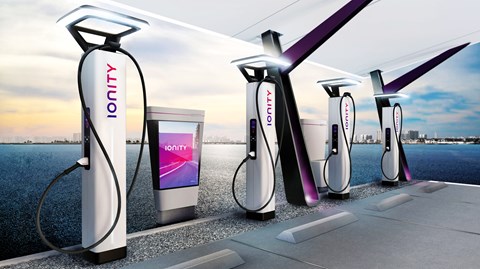
Who pays for public electric charging stations?
The charge point providers suck up the cost of installing the equipment, working with energy providers and local authorities. There have been grants from the UK government and EU to help accelerate the roll out of networks and in turn, encourage drivers to make the switch to electric.
In terms of electricity used at the charge point, who pays depends on the provider and the location. In the main, EV charge point providers have an app, enabling customers to input their debit or credit card details, to pay for their charge.
In 2019, the UK government advised all charging point providers to integrate contactless payment to improve accessibility of charge points and strengthen the UK’s public charging infrastructure. However, computer chip shortages and supply chain issues have delayed some providers’ roll out of those contactless pads.
Some charge points are provided free-of-charge, as a customer perk at some businesses (thank you, Tesco). If drivers have difficulties trying to initialise the charge, or connect the app to make payment, it’s always worth calling the device provider – the contact details and device ID are on the charger. Sometimes providers can initiate a charge remotely, helping to get you on your way.
The UK’s electric car charging companies providing public networks
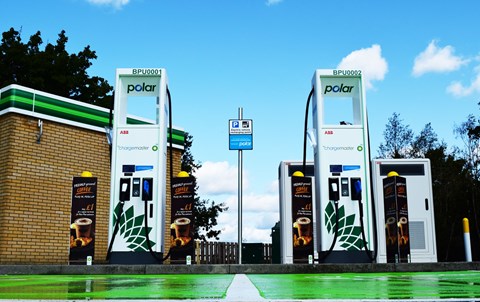
BP Pulse
Having amalgamated the Polar Network and Chargemaster, the BP Pulse network is now one of the largest. Rapid BP Pulse points can be found on BP forecourts. With 8,000 points, from ‘fast’ 7kW chargers to rapid 150kW chargers, there’s a good selection. You connect to the device through its mobile app plus members get discounts, including free-of-charge use at selected points. Pricing: Subscribers and members pay between 44p and 67p per kWh. Guests or Contactless users between 57p and 69p per kWh, depending on power delivery.
Our Verdict: The size of the BP Pulse network means you’ll definitely come across its chargers at some point. On the whole, the experience is positive—the points accept contactless and some devices are opened to ‘free vend’ if there’s remote communication issues. There are too many ‘out of order’ services though and that’s frustrating since an account is £7.99 per month and guest charging isn’t cheap.
Chargeplace Scotland
Chargeplace Scotland is run by the Scottish Government. Aiming to make EV charging accessible to all along the full length of the country, there’s over 2,000 charge points. Access means downloading and registering on the app. Pricing: From free at selected points to 16p per kWh, with £1 minimum charge.
Our Verdict: Finding Chargeplace Scotland is easy enough and in decent locations. The map on a desktop browser works very well, but there’s reliance on the app, which isn’t so decent, and there’s no contactless access, so you’re forced to deal with a frustrating app registration experience.
Chargeyourcar
The Chargeyourcar, or CYC, network is a bit cheaper to use, but as one of the longest-established networks in the UK, these slower chargers require app registration or drivers to receive the RFID car access card in advance. Pricing: from 20p per kWh, depending on location, with a minimum charge of £1.
Our Verdict: CYC points are found at locations where we ‘dwell’, such as shopping malls and town centres. These 7kW will only really give you the juice you used to get to your destination. But CYC charges an overstay fee of £5 for sessions over one hour, so they’re not a suitable place to leave your car overnight for maximum range.
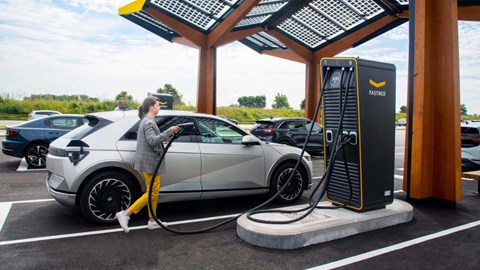
Fastned
Using 100% renewable energy, Fastned is fast creating a rapid charging network, predominantly in the North East of England, where it won a tender to roll its technology out. Seven locations boast multiple chargers, with pay-as-you-go contactless access, or Gold membership sign in (via its app), which offers discounts. Pricing: Gold members 45p per kWh (with £9.99 monthly fee) or 65p per kWh for guests.
Our Verdict: Fastned provides a reliable network, though locations aren’t yet nationwide. Access is very ‘tap and go’ and although Fastned pricing is expensive, availability and reliability can be trusted.
GeniePoint
Engie EV solutions runs the Geniepoint network. Predominantly located in southern England, Geniepoint requires you to register on its app before you can access its points. Pricing: 57p per kWh
Our Verdict: Mixed. Customer services are more responsive than the app. The communication between the devices and the Geniepoint app isn’t reliable and we have experienced leaving the car to charge, only to return later and find no charge has taken place. It’s also a bit pricey.
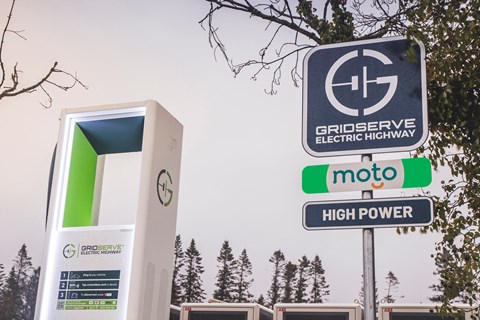
Gridserve
Gridserve now runs the Electric Highway, originally established by Ecotricity. In March 2020, the first Gridserve Electric Forecourt opened in Braintree, Essex. Able to charge 24 cars simultaneously with an area for food, drink, shopping and dog walking. Pricing: from 39p per kWh, depending on location. Electric Forecourts are 45p per kWh.
Our Verdict: Easy-to-use, fast and efficient means Gridserve is fast establishing a reputation for reliability. Gridserve also has ambitious plans to roll out 350kW chargers (great for charging your Porsche Taycan), so we’ll be happy to keep tabs on this growing network via its interactive map.
Ionity
Backed by the EU, Ionity is a brand partnering with key car makers. Again your Taycan will love Ionity’s ultra rapid 350kW chargers, delivering a top up to 350kW in less than 20 minutes. There’s only 16 locations peppering the nation. Pricing: 35p per kWh for members (paying £16.99 per month), or 69p per kWh for contactless guests
Our Verdict: Ionity hasn’t quite nailed the efficiency of some of the others on this list. Lightning fast is great, but jaw-droppingly expensive for guests just rocking up.
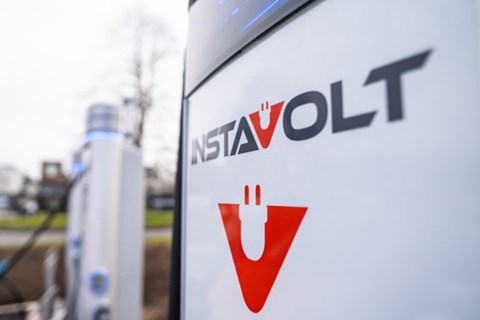
Instavolt
With 800 charge points and counting, Instavolt is the UK’s largest owner operator of rapid DC charging points. There’s a further 600 planned over next 12 months, and they’re spread more evenly across the UK. Pricing: 66p per kWh
Our Verdict: Instavolt enjoys a great reputation because you just turn up and tap to use these efficient rapid chargers. Located in logistically well-considered places, we consider Instavolt to be one of the best.
Osprey
Osprey has a rapid charging network, like Fastned and Gridserve. Though its 170 sites tend to be destinations, such as supermarkets, pubs and coffee shops. Signing up to the app is good for company car drivers, as there’s access to monthly billing and receipts for expenses. Pricing: 66p per kWh
Our experience: We’ve yet to try Osprey points, but we’re encouraged to learn that all Osprey points have contactless payment access.
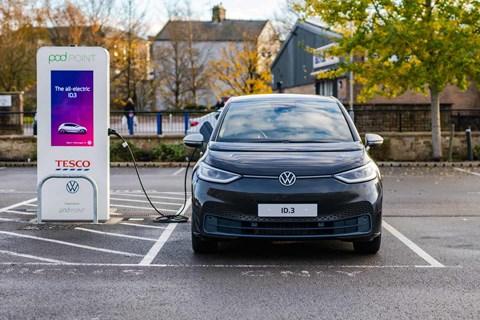
Pod Point
Providing domestic and commercial charge points, as well as operating its own charging network, Pod Point has good coverage over the UK. Tesco and Lidl are two of many brands that has partnered with Pod Point to support its roll out to destination locations. Pricing: From free to 44p per kWh, for rapid charging. Chargers at Lidl supermarket locations are 28p per kWh.
Our Verdict: Mixed. The charge points are really well-located and abundant. The app, however, struggles to communicate with the devices reliably. Sometimes it’s great, other times we’re so frustrated. This should improve with 5G connectivity though.
Shell Recharge
Shell has a medley of rapid and ultra-rapid points in its Recharge network, generally found on forecourts of their refuelling stations. In the UK capital, Fulham’s Shell charging hub has nine charging stations, a Costa cafe and Little Waitrose supermarket. Pricing: 45p-65p per kWh
Our Verdict: We fundamentally struggle with the idea of sitting on a forecourt to charge up (dangerous, fumey and who really wants to sit in their car during the charge after sitting for a long journey?). We have yet to assess Shell’s network to charge (watch this space). Nonetheless, the flexibility of using the Shell Recharge app or reliable contactless, means Shell’s already on the right track for creating a decent EV network. Shell also is in the unique position to be able to offer its Shell Energy customers discounts, so it will likely be a big player, despite its fossil-fuel based history.
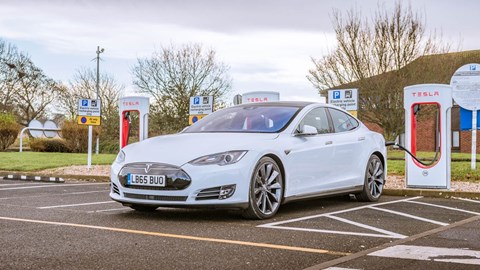
Tesla Superchargers
Establishing a network so early on has paid dividends for promoting Tesla’s EV sales. There’s now 780 chargers across 87 locations. Some locations are now open to non-Tesla drivers. Pricing: Tesla owners get 1,000 miles per year free, then pay between 22p-32p per kWh. Non-Tesla drivers pay from 50p per kWh, depending on power delivery.
Our Verdict: Nothing beats the simplicity of using the Tesla Supercharger network. There’s always plenty of points available, in smart locations and they’re so easy-to-use.
What’s the best EV charging network in 2024?
We’ve found Instavolt and Tesla chargers are the best EV charging networks, for their ease-of-use and availability, especially for guest usage.
Tesla is gradually opening up its chargers to other brands, but it’s not 100% rolled out yet, so watch out. And while we love the easy access and tap-to-use payment system, remember that Instavolt pricing is among the highest of all the UK networks.
Further electric reading